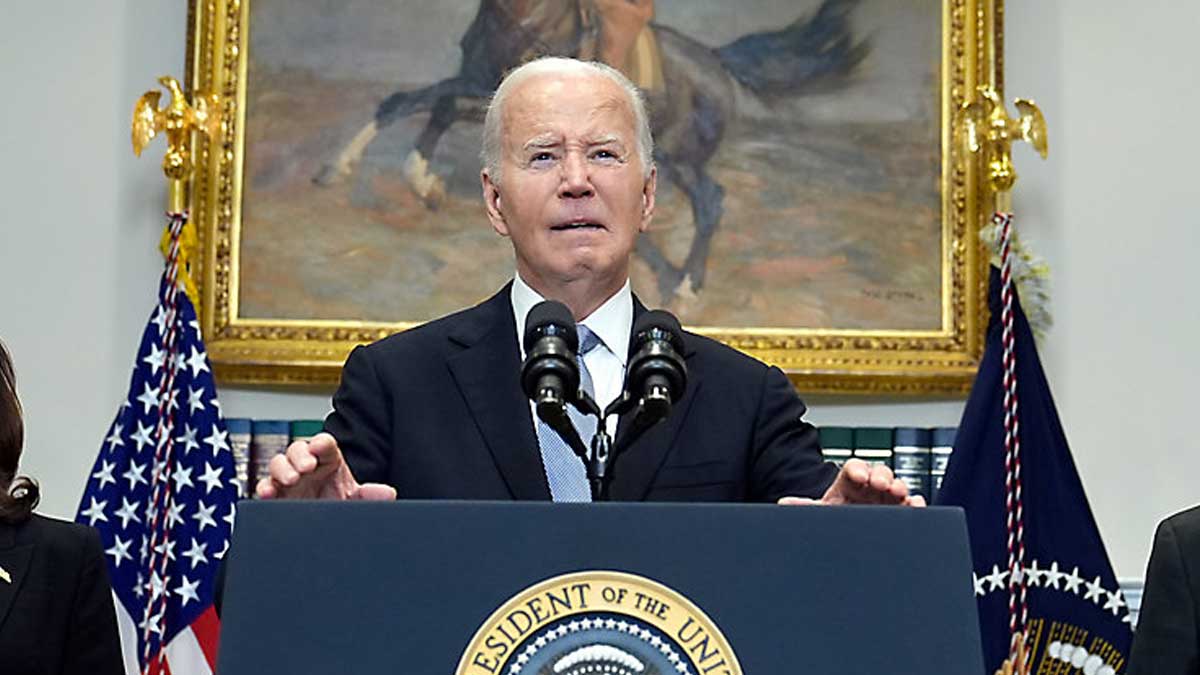- Home
- Billionaires
- Investing Newsletters
- 193CC 1000
- Article Layout 2
- Article Layout 3
- Article Layout 4
- Article Layout 5
- Article Layout 6
- Article Layout 7
- Article Layout 8
- Article Layout 9
- Article Layout 10
- Article Layout 11
- Article Layout 12
- Article Layout 13
- Article Layout 14
- Article Sidebar
- Post Format
- pages
- Archive Layouts
- Post Gallery
- Post Video Background
- Post Review
- Sponsored Post
- Leadership
- Business
- Money
- Small Business
- Innovation
- Shop
Recent Posts
GOP Plans Lawsuits Over Biden’s Exit, Experts Doubt Outcome

President Joe Biden’s announcement on Sunday that he will withdraw from the 2024 presidential race has triggered speculation among Republicans about potential legal challenges. They argue that Biden’s exit could lead to lawsuits challenging changes to state ballots. However, election law experts assert that Biden’s departure before the Democratic National Convention shouldn’t present any significant legal hurdles.
Prior to Biden’s announcement, right-wing groups like the Heritage Foundation and House Speaker Mike Johnson, R-La., suggested that Republican legal action might follow if Biden exited the race. They claim such a move could breach state regulations on candidate withdrawal or substitution, arguing that it could lead to pre-election litigation in states with strict rules against removing candidates for political reasons, such as South Carolina and Wisconsin.
The Heritage Foundation’s June memo highlighted that some states’ laws make it difficult to change a candidate once they’re on the ballot. They cautioned that Biden’s withdrawal could potentially spark legal battles in these states, complicating the process and possibly leading to unsuccessful outcomes.
Nevertheless, election law experts have largely dismissed these legal threats. They argue that since the Democratic Party’s nominee is not officially determined until the convention, the laws concerning candidate changes wouldn’t apply if Biden withdraws before that time. UCLA law professor Rick Hasen criticized the Heritage Foundation’s memo, emphasizing that Biden is not the party’s nominee yet, and laws generally address the official nominee.
Hasen further pointed out that Wisconsin’s law, cited by the Heritage Foundation, only pertains to formal presidential nominees. According to Wisconsin law, the presidential nominee is selected at the party’s national convention, not before it.
University of Kentucky voting rights professor Josh Douglas weighed in on X (formerly Twitter), asserting that any legal challenge against Biden’s exit would lack merit and would be a political maneuver rather than a genuine legal concern.
Marc Elias, a voting rights attorney associated with the Democratic Party, also dismissed the legal challenges, stating on X that the Democratic nominee will appear on all state ballots and that there is no basis for any legal challenge.
The specifics of where and when Republicans might file legal challenges remain unclear. The Heritage Foundation’s memo indicated that most states defer to national parties for nominating replacements if a candidate withdraws. Therefore, any lawsuits might be aimed at states with specific rules, including Nevada, Georgia, Wisconsin, and South Carolina. Additionally, Hasen mentioned the possibility of a lawsuit in Ohio, where the state legislature recently moved the deadline for finalizing presidential nominees to after the Democratic National Convention. This new law will not take effect until September 1, which might give Republicans an opportunity to challenge the candidate switch before then.
There are also concerns that Biden’s withdrawal could lead to lawsuits from voters who might argue that the Democratic Party is overriding the will of primary voters. However, these lawsuits are also unlikely to succeed. In primary elections, voters choose delegates who are responsible for formally nominating candidates at conventions. While delegates are traditionally pledged to the candidate chosen by voters, this is not a legal requirement. Andy Craig, director of election policy at the Rainey Center, noted that national parties control the nomination process, and primary elections are essentially nonbinding straw polls managed by state governments. The Brookings Institution also observed that Democratic Party rules state that delegates pledged to a candidate “shall in all good conscience reflect the sentiments of those who elected them,” allowing them to vote for another candidate if necessary.
On Sunday afternoon, President Biden announced his decision to step down from the 2024 race, stating that it is in the best interest of his party and the country for him to focus on his presidential duties for the remainder of his term. He endorsed Vice President Kamala Harris as his successor shortly after. This decision followed increasing pressure from Democratic lawmakers and donors, particularly after Biden’s underwhelming performance at the June 27 presidential debate, which raised concerns about his mental fitness. Despite public denials from Biden and his campaign staff about his potential withdrawal, it was reported by The New York Times that the president’s senior campaign staff was informed of his decision only moments before the official announcement.
Recent Posts
Categories
- 193cc Digital Assets2
- 5G1
- Aerospace & Defense46
- AI37
- Arts3
- Banking & Insurance11
- Big Data3
- Billionaires449
- Boats & Planes1
- Business328
- Careers13
- Cars & Bikes76
- CEO Network1
- CFO Network17
- CHRO Network1
- CIO Network1
- Cloud10
- CMO Network18
- Commercial Real Estate7
- Consultant1
- Consumer Tech180
- CxO1
- Cybersecurity68
- Dining1
- Diversity, Equity & Inclusion4
- Education7
- Energy8
- Enterprise Tech29
- Events11
- Fintech1
- Food & Drink2
- Franchises1
- Freelance1
- Future Of Work2
- Games141
- GIG1
- Healthcare78
- Hollywood & Entertainment186
- Houses1
- Innovation42
- Investing2
- Investing Newsletters4
- Leadership65
- Lifestyle11
- Manufacturing1
- Markets20
- Media193
- Mobile phone1
- Money13
- Personal Finance2
- Policy567
- Real Estate1
- Research6
- Retail1
- Retirement1
- Small Business1
- SportsMoney33
- Style & Beauty1
- Success Income1
- Taxes2
- Travel10
- Uncategorized8
- Vices1
- Watches & Jewelry2
- world's billionaires418
Related Articles
Trump Moves $4B Stake in Truth Social Parent, Stock Drops 6%
Donald Trump recently transferred his 57% stake in Trump Media & Technology...
By 193cc Agency CouncilDecember 20, 2024House Rejects Trump-Backed Funding Bill, Shutdown Looms
The U.S. House of Representatives rejected a new government funding bill on...
By 193cc Agency CouncilDecember 20, 2024Trump Named Time’s Person of the Year for Second Time
On Thursday, Time magazine honored Donald Trump as its “Person of the...
By 193cc Agency CouncilDecember 12, 2024Meta Donates $1 Million to Trump’s Inaugural Fund
Meta, the parent company of Facebook and Instagram, has confirmed a $1...
By 193cc Agency CouncilDecember 12, 2024















Leave a comment